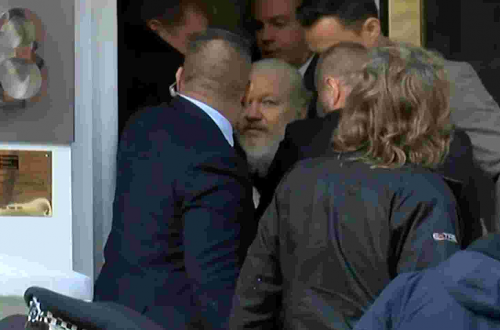by Joseph W
Vanity Fair has a terrific expose of Julian Assange’s relationship with English-language media publications the Guardian and the New York Times, and how Assange brought on-board other European publications Der Spiegel, Le Monde, El Pais, and also Channel 4.
However, there is no mention of Assange’s relationship with the Russian media.
On November 28 2010, Wikileaks began releasing files via these media channels. The next day (29/10/10), Israel Shamir wrote in the Ruskiy Reporter:
So that the cables are able to reach interested readers, their publication will take place alongside the leading magazines of the world, [including Wikileaks’] main partner in Russia – “Russian Reporter”. In addition, Wikileaks has attracted several independent journalists from different countries: Britain and the U.S., Sweden and Russia, France and Brazil. Posts on the Wikileaks site will complement the newspaper and magazine publications.
Here, Shamir gleefully predicted that Wikileaks would “blow up” the world.
He wrote:
Before the speech of Iranian President Ahmadinejad at UN General Assembly, the State Department sent a directive to all European countries, pointing to them when their representatives should leave the hall. The directive was painted in detail exactly which words or themes in a speech by Iranian President to serve as a signal to the care of a country. Instructions had already been given. But not without intrigue: the Swedish delegate had the instructions to leave the hall when Ahmadinejad mentions the Holocaust. But Ahmadinejad did not mention the Holocaust. Representatives of other European countries came out, but the Swede remained in the hall, sending alarms and requesting further instructions from their American mentors: what to do?
Interestingly, Julian Assange recently said something almost identical on Al Jazeera, although Assange added that this amounted to a “conspiracy” against Ahmadinejad saying “important things about the Holocaust and the Jews”.
Ruskiy Reporter also published a photo of Shamir with Assange, claiming it showed both men working on the Wikileaks archive:

In the article, significantly, Shamir commented on what Wikileaks would reveal about one particular Eastern European democracy:
Secret files reveal that the U.S. embassy was present behind the scenes during the orange era in Ukraine. In particular the orange Interior Minister Yuriy Lutsenko told the U.S. ambassador to Ukraine that he had received an order from the Attorney General to arrest Alexander Turchinov and Andrew Kozhemyakina – supporters of Timoshenko – for having destroyed documents of the SBU, which indicated the connection between Tymoshenko and criminal businessman Semion Mogilevich. Lutsenko called the Attorney General Medvedko’s order crazy, and naturally, did not comply. This is interesting, not only as to how the events unfolded, but also the degree of involvement of the [US] Ambassador in the internal affairs of Ukraine.
So according to Shamir (29/10), Ukraine’s Orange movement was deeply influenced by the USA. [On a similar topic, Shamir has claimed on his own blog that “Yushchenko is supported by the Jewish oligarchs” and “Ukraine can be free in union with Russia – or in thrall to the West and the Jews”]
Three weeks later, Shamir is invited to Belarus as an international observer for the presidential election, and also meets with the head of Lukashenko’s presidential administration, Uladzimri Makei. Interfax Russia reported:
I. Shamir present in Minsk as an international observer during the presidential elections as the only accredited journalist at the Russian-speaking site Wikikeaks.
“In my opinion, people and spend grants. Of course, the U.S. grants they practice”, – said I. Shamir, commenting on the incident at the Independence Square in Minsk.
“If we look at Wikileaks, then there was today published a dispatch, which refers to the black channel of” who is the Belarusian opposition. It says that anyone caught with 25 thousand dollars of “live” money. We have to think that it is not unique case, “- said the source.
In his opinion, the financial mechanism of the Belarusian opposition is a complex system of interaction between state and formally independent funds. “For example, the American Foundation National Endowment for Democracy – is one such organization which is engaged in nurse opposition. Such organizations are trying to impose the American model in his own way”, – said I. Shamir.
Two days after Lukashenko’s “re-election”, we read in Radio Free Europe:
At a press conference today, during which the hardline ruler voiced no remorse for ordering police to beat protesters during post-election demonstrations, Lukashenka announced the upcoming publication of classified documents that he says will demonstrate the nature of interactions between the Belarusian opposition and the West.
Russian news agencies quoted him as saying, “We’re simply going to publish certain documents. We’ll see how those who are published on the Belarusian WikiLeaks site — the supporters [of the opposition] and those who are working behind the scenes — react to this.”
“We will publish all the documents that should be classified in the archives as ‘secret.’ These are historically important events,” he said.
Whilst Lukashenko ordered to close down the office of the OSCE in response to EU observer comments about his re-election, he was simultaneously championing Wikileaks’ rep Shamir.
I wonder whether Lukashenko was impressed by Shamir’s piece (29/10) in Ruskiy Reporter, as a representative of Wikileaks.

